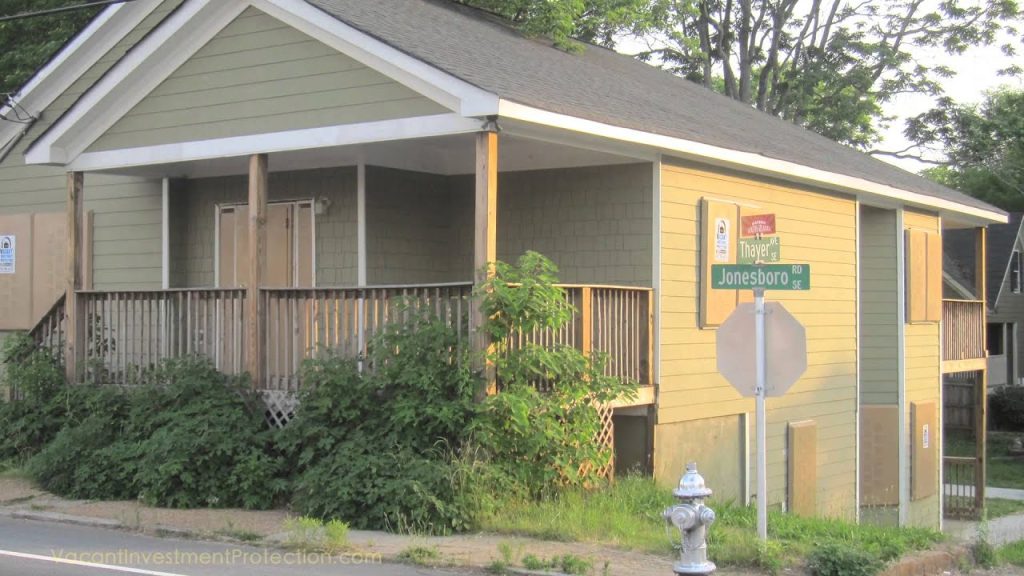
Commercial property is increasingly left vacant. Buildings like warehouses and landsites are increasingly left unattended – and as a result – there’s been a serious increase in problems like vandalism and squatting. This makes getting commercial property security vital. Otherwise, you can end up suffering serious financial losses and other major issues.
In this article we’ll discuss the vulnerability of vacant property and ways to protect against it.
Why is Vacant Property so Vulnerable?
Vacant property is vulnerable because potential thieves, squatters, and vandals don’t face any serious barriers to breaking and entering. This makes the properties very attractive to trespassers since the potential to be caught and prosecuted is much lower than with an occupied property.
Threats to Vacant Property
These are just some of the dangers posed to vacant properties.
Vandalism
Vandals will frequently target vacant properties because of how vulnerable they are.
Vandalism can cause serious damage. It can consist of anything from the breaking of windows and graffiti to the destruction of flooring, walls, wiring (which can easily result in fires), and pipework (which can easily result in flooding). The costs of vandalism can quickly mount, and the damage caused by vandals can end up difficult to repair as well. Therefore, it is so important to ensure you are protected from vandals on your property.
Arson
Out of all the forms of vandalism, arson is by far the worst.
British fire services report that around half of the fires they deal with are deliberately started. A fire can gut a property – causing damage which cannot be repaired and leaving the property unusable.
Squatting
Squatting has become a serious issue in Britain.
Squatters live on empty property without permission, and it is now estimated there are around 20,000 people squatting in properties all over the UK. The laws regarding squatting are complex and hotly debated – making removing squatters very, very difficult once they are present. The longer squatters are present in a property, the harder they will be to evict.
Squatters are liable to steal, vandalise the property, and cause serious property damage. While the squatters are present you will of course be unable to make use of it – which is a serious problem itself. A squatter issue can end up becoming a very costly one and last for months.
Theft
Thieves are not interested in confrontation and want to access goods and materials as easily as possible. Vacant properties, having no one to protect them and often housing valuable goods or materials.
Metal theft has become a particularly common crime. The profits from the sale of stolen metal are lucrative. The most common target is copper – which is in practically any property. Increasingly thieves steal copper from air conditioning units – which are ripped apart frequently. This not only means the destruction of the AC unit but leaves holes in the property that often result in further damage via exposure.
Copper isn’t the only target – aluminium, steel, and other metals like brass and bronze are particularly appealing. Cast iron is also increasingly stolen. This means that practically any location with metals worth stealing is at risk.
In the past, railways were the primary target of metal theft – but now practically any property is vulnerable. Churches, statues, and public artwork have been targeted. Vacant and unprotected properties are the main target, however – especially large industrial buildings in areas with little to no traffic. Foreclosed homes are another serious target of metal theft.
Protecting Vacant Property
Security is vital to protect a vacant property.
Cheap methods like signs and fences shouldn’t be used – these don’t do anything to prevent dedicated intruders from entering.
Alarms and manned guarding services are a good approach. Alarms are often a major deterrent and criminals will avoid properties equipped with them – since the police or authorities will be alerted.
Manned guarding is another great approach. The physical presence of people on the property is usually enough to ward off any intruders. In the case an incident does happen, manned guarding services can respond immediately or alert the authorities quickly.
CCTV
CCTV is probably the best way to protect a vacant property.
CCTV is great because its presence alone will deter criminals; 60% of criminals say the presence of CCTV will encourage them to avoid a property. This is because getting caught on CCTV massively increases the chances of being caught and prosecuted. The visible presence of CCTV is a great way to keep your property secure.
Remote monitoring is also a common feature of modern CCTV. This means a professional monitoring team will keep a close eye on the property – alerting you or
Modern CCTV systems, with sturdy armoured protection casing to prevent sabotage and the ability to be deployed in practically any environment, a V360 CCTV system is a versatile approach for the protection of a vacant building.
